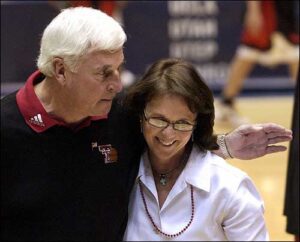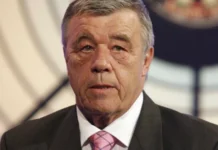Bob Knight, known as “the General,” was a prominent American men’s college basketball coach. He achieved remarkable success, winning 902 NCAA Division I men’s basketball games, a record at the time of his retirement, and currently ranking fifth all-time. Knight served as the head coach of the Indiana Hoosiers from 1971 to 2000.
Bio/Wiki
Age-83 years
Height- 1.96 m
Weight- 84 kg
Full name-Robert Montgomery Knight
Born-25 October 1940
Birth place- Orrville, Ohio, United States
Died- 1 November 2023
Spouse-Karen Vieth Edgar (m. 1988), Nancy Falk (m. 1963–1985)
Profession-American basketball coach
Nationality- American
Teams coached-Texas Tech Red Raiders men’s basketball (2001–2008), MORE
Family
Born in 1940 in Massillon, Ohio, Knight was raised in Orrville, Ohio. His father, Pat, worked in the railroad industry and grew up on an Oklahoma farm, while his mother, Hazel, was a school teacher.
Wife and Children
On April 17, 1963, Knight tied the knot with Nancy Falk, and together they had two sons, Tim and Pat. However, their marriage ended in divorce in 1985. In 1988, Knight married Karen Vieth Edgar, a high school basketball coach from Oklahoma. Knight was 47 years old, while Edgar was 41 at the time of their marriage.


Career
He initiated his organized basketball journey at Orrville High School.
During his tenure at Army, Knight led the Black Knights to four post-season tournament appearances in six seasons, achieving a remarkable two-thirds winning record. Upon taking the helm at Indiana, Knight’s teams clinched three NCAA championships, one National Invitation Tournament (NIT) championship, and 11 Big Ten Conference titles. His 1975–76 team achieved perfection during the regular season and secured the 1976 NCAA tournament title. Knight earned National Coach of the Year accolades four times and was named Big Ten Coach of the Year eight times. In 1984, he coached the U.S. men’s Olympic team to a gold medal, a feat accomplished by only three basketball coaches in history who have won NCAA, NIT, and Olympic titles. Knight revolutionized college basketball with his popularization of the motion offense.
Despite his coaching brilliance, Knight was no stranger to controversy due to his outspoken nature and volatility. He made headlines for incidents such as throwing a chair across the court, being arrested following a physical altercation with a police officer, and engaging in verbal conflicts with the media. A video showing Knight allegedly choking an Indiana player during practice led the university to enforce a “zero tolerance” policy specifically for him. Following another altercation with a student, Knight was fired in 2000. He later coached at Texas Tech, where he mostly remained incident-free from 2001 to 2008. Under his guidance, the Red Raiders qualified for post-season tournaments five times in seven full seasons. Knight retired midway through the 2007–2008 season and was succeeded by his son, Pat Knight, at Texas Tech. Despite the controversies, Knight continued to be revered by many of his former players and Indiana fans.
Knight was prominently featured in various films and television productions. In 1994, a feature film titled “Blue Chips” showcased a character named Pete Bell, a passionate yet honest college basketball coach who, under immense pressure to win, decides to break NCAA rules to assemble a competitive team following a disappointing season. Additionally, ESPN’s inaugural feature-length film, “A Season on the Brink” (2002), was a television adaptation based on John Feinstein’s book.
Knight also made appearances in commercials, notably in a TV ad for Guitar Hero: Metallica alongside fellow coaches Mike Krzyzewski, Rick Pitino, and Roy Williams, parodying Tom Cruise’s iconic scene from “Risky Business.”
In 2009, Knight took on a different role as a producer, creating three instructional coaching DVD libraries focusing on motion offense, man-to-man defense, and developing mental toughness, all in collaboration with Championship Productions.
In 2008, Knight transitioned to ESPN, where he served as a men’s college basketball studio analyst during Championship Week and NCAA Tournament coverage until the 2014–15 season. On February 8, 2020, Knight was celebrated at an Indiana basketball game, marking his first attendance at an Indiana game since his dismissal by the school two decades earlier.


Controversy
In the 1970s, it was reported years later that Knight physically assaulted IU’s longtime sports information director, Kit Klingelhoffer, allegedly choking and punching him over a news release that upset the coach.
Moving to the 1980s, an incident occurred during a game between Indiana and Purdue on January 31, 1981. Hoosier star Isiah Thomas was accused of hitting Purdue guard Roosevelt Barnes, described by some as a “sucker punch.” However, video replay later revealed that Barnes had thrown the first punch, and Thomas had merely reacted in self-defense. Knight, upset by derogatory chants directed at him, his wife, and Indiana University during a later game, invited Purdue athletic director George King on his television show to discuss the matter. When King declined, Knight symbolically represented Purdue with a “jackass” (male donkey) wearing a Purdue hat. The 1980–81 Hoosiers went on to win the 1981 NCAA National Championship.
In the 1990s, an incident occurred before an Indiana–Purdue game in 1991, where Knight used explicit language and threats to motivate his team, unaware that someone was secretly recording the speech. This recording later gained significant attention online. Additionally, allegations surfaced about Knight physically threatening his boss, Clarence Doninger, after a game in 2000.
An investigation at Indiana University revealed instances where Knight berated and physically intimidated a university secretary, threw a potted plant in anger, and reportedly attacked assistant coach Ron Felling.
In April 2011, a video surfaced in which Knight made controversial comments about John Calipari and Kentucky’s basketball team. Knight claimed that Kentucky players had not attended classes, but these allegations were disproven, leading to Knight’s apology. Furthermore, former Indiana basketball player Todd Jadlow alleged in a book that Knight physically abused him and other Hoosiers, including punching him in the face, breaking a clipboard over his head, and engaging in other abusive behaviors from 1985 to 1989.
Achievement/Awards
- Knight received national coach of the year awards in 1975, 1976, 1987, and 1989, showcasing his coaching excellence and innovation.
- He was honored as the Big Ten Coach of the Year eight times, emphasizing his consistent success within the conference.
- In 1991, Knight’s contributions to basketball were officially recognized as he was inducted into the prestigious Naismith Memorial Hall of Fame, a testament to his significant impact on the sport.
- During the subsequent season, Indiana made its final trip to the Final Four under Knight’s leadership, marking a memorable period for the team and its legendary coach.
Net Worth 2023
At the time of his passing, Bobby Knight’s estimated net worth was $14 million.
Bob Knight’s Cause of Death
In Bloomington, Indiana, the legendary coach Bob Knight, celebrated for his brilliance and fiery demeanor, passed away at the age of 83. Knight, who secured three NCAA titles for Indiana and became an iconic, albeit controversial, figure in college basketball, succumbed to poor health after being hospitalized with an illness in April.


The news of his passing was shared by Knight’s family on social media, expressing their gratitude for the thoughts and prayers extended by well-wishers. The family honored Knight’s wish for a private gathering, requesting respect for their privacy during this time.
Knight’s legacy in the sport is undeniable; he amassed 902 victories over 42 seasons at Army, Indiana, and Texas Tech, shaping some of America’s finest coaches along the way. He also led the U.S. Olympic team to a gold medal in 1984. Unfazed by public opinion, Knight famously chose Frank Sinatra’s “My Way” to mark his 880th win in 2007, a record for a Division I men’s coach at that time.











































